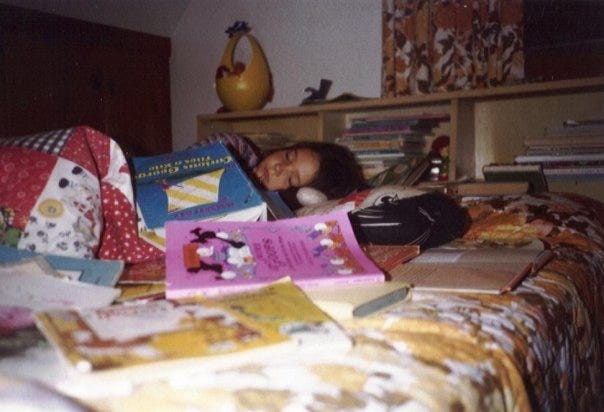How and When Little Alethea Started Writing Poetry
There was a little girl who had a little curl...
It’s National Poetry Month, and I’m a huge lover of poetry, so I’m going to stick with this theme for a while, if y’all don’t mind. Feel free to leave any questions in the comments!
If you’d like to support my effort to publish more essays like this, please consider getting a Substack subscription, becoming a Patron, or tossing a buck in the tip jar that Chris and I can use it for gas money when we’re out stormchasing in May!
How and When Did You Start Writing Poetry?
On April 1st, I watched a fabulous panel hosted by Highlights to launch National Poetry Month. I am a big fan of the Highlights Foundation and their campus up north, and I look forward to the next time I’m able to schedule some writing time in one of their cabins. I am also a big fan of Charles Waters and Irene Latham and the fantastic anthologies they continue to assemble. This panel in particular celebrated the release of the gorgeous If I Could Choose a Best Day: Poems of Possibility and included a few poets from the book—all of whom I am now also a fan.
I tell you all of that to say: someone asked a question about rhyming poetry, and the answer included something I had never heard before. Rhyming poetry is mainly aimed at younger readers, to help them with things like word repetition and mnemonic devices as they learn to read. As folks get older, many lose their need or desire for such rhyme and naturally shift into preferring to read (and write) freeform poetry.
This was both a groundbreaking and mind-blowing idea to me. Especially as a poet who doesn’t actually remember learning how to read.
I was a genius baby with an eidetic memory whose parents read aloud to her every night. I taught myself to read by age three. By age four I regularly pored through the TV Guide when it arrived in the mail every week, a habit that got me an express ticket to kindergarten a year early. To say I was an avid reader by age five is not an understatement—Alethea’s tendency to have her nose stuck in a book every waking hour was such a family joke that it resulted in this now-famous photo taken of me, asleep in a bed full of books. My happy place. My happy places.
I didn’t love poetry because it was fun and helped me learn how to read.
I loved poetry because it was genius.
On that bed in the picture are some of the Goops books gifted to me by my Aunt Theda. These poetry books, written by Gelett Burgess in 1904, warned children that if they didn’t mind their manners and continued to act like brats, they would turn into strange, globe-headed monster-like children called Goops. My Greek grandmother—a huge anglophile who raised us exclusively on children’s songs from the UK—knew all the words to the original Goop poem and recited it often. “Don’t be a Goop!” was said in our house. A lot.
My family also called me “the little girl with the little curl,” from the Henry Wadsworth Longfellow poem. I had curly hair back then, see. And “when I was good, I was very good indeed, but when I was bad, I was horrid.” They reminded me of this, too. A lot.
Now I’m wondering if it’s rare to come from a family that used poetry to scold their children. No matter what century you’re from.
So I guess it’s no surprise that my first favorite writers were Gelett Burgess, Ogden Nash, and Lewis Carroll. I loved when poetry snuck its way into prose, like Carroll did with the Alice books. The fairy tales, too, sometimes. Frances Hodgson Burnett’s “My daddy has to go away” poem in The Little Princess was the perfect mantra for this girl whose father traveled all over the world for his job. And when Megan Follows performed “The Highwayman” as Anne of Green Gables for the CBC…well, I found that poem in the anthology Favorite Poems Old and New on my French grandmother’s bookshelf, but it was just too long to memorize the whole thing.
So I memorized “If” by Rudyard Kipling instead.
When that eidetic memory and love of words turned me into an actor at age seven, I instantly fell in love with lyrics from musicals. “I Won’t Grow Up” from Peter Pan became my life goal at age eight. And, of course, my parents took their budding actor to every Shakespeare in the Park they could find. WOW did I adore Shakespeare! I rarely made As in English class—it was by far my worst subject—but whenever we read Shakespeare, I aced every paper.
I think when most kids are bored at the doctor’s office, they read a copy of Highlights. When I was bored, I recited poetry to myself. “If,” and “The Jabberwocky” and “Annabel Lee” were among my favorites, but there were a million more to choose from, long and short, old and new. And then I started writing my own.
Rhyme? No problem. Meter? Love it. Rhythm? My first favorite word. Sonnets? Give me a topic and I’ll have one drafted in 20 minutes or less. Getting poetry published, however? Well now, that’s a horse of a different color. But the Hows and Whens? I can’t pin down exact dates for you, but I think this pretty much covers it.
Do you like poetry? What kind is your favorite?







Well, I confess that I've never "gotten" poetry. If a person has something to say, just say it, that's my motto.
However, I can appreciate a good lyric, elegant prose, etc. So I have a blind spot.
I have tried, for the last several years, to read some poetry every day, So someday it might sink in.